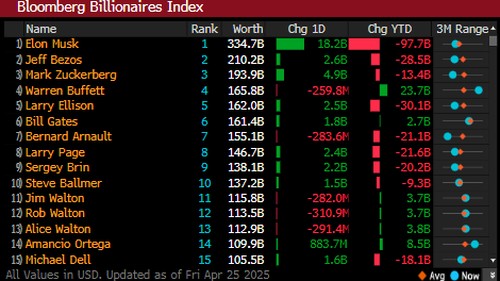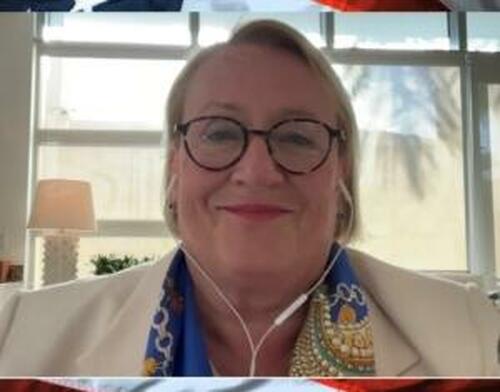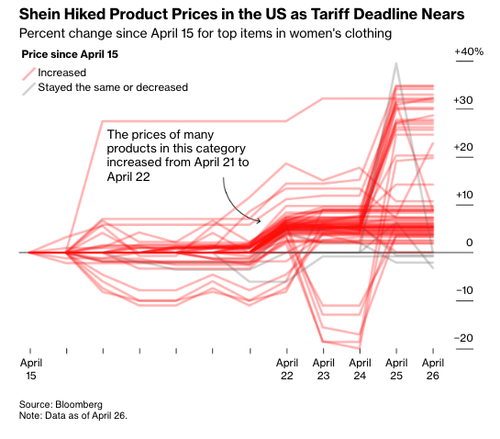To live without faith, without a patrimony to defend, without a steady struggle for truth – that is not living, but existing.
Distinction Matter - Subscribed Feeds
-
Site: non veni pacem
(Note well, his base premise is false. The Bergoglian conclave of 2013 was invalid because the true Pope yet lived, and never validly resigned. But this is quite an essay, reprinted here for the record. -nvp)
An open letter from
Professor Dr. phil. habil. Josef Maria Seifert
Kartäuserstraße 16/6
3292 Gaming, N.Ö.
AustriaTo His Eminence Cardinal Dean Gian Battista Re
Gaming, April 24, 2025
On the Need to Examine before the next Conclave the Formal Accusation of Heresy launched by Archbishop Viganò (and supported by many distinguished theologians, jurists and philosophers world-wide) against Pope Francis
Your Eminence, dear Cardinal Dean Giovanni Battista Re,
Most cordial Greetings in Christ. I address myself to you, dear and highly revered Cardinal Dean Re, because You alone now hold the authority to let an investigation of the accusation of heresy brought up against Pope Francis, take place before the upcoming Conclave.
You hold until the election of the next Pope the highest authority in the Catholic Church, will invite, in union with the Camerlengo Kevin Joseph Cardinal Farrell, the qualified Cardinals of the whole world under the age of 80 to elect the new Pope and can determine the date of the next Conclave.
I make my letter to you an open letter because of the short time that remains to settle issues of extreme importance and urgency.
I discovered through the text J’accuse of archbishop Viganò two – through the solemn invocation of the See of Peter and their declaration of being valid for all times – probably dogmatic and certainly most authoritative pontifical documents on the issue of “heretical Bishops, Cardinals and Popes” by Pope Paul IV and St. Pius V.
These texts seem to me to be of the highest importance for the Church at the present moment.
They solemnly demand that the Church proceed with an examination of accusations of Papal heresy.
Simply to have excommunicated an archbishop because he exactly acted as a prominent and a Holy Pope demanded solemnly to act when faced with a Pope who adhered to Heresies prior to, during and after his election to the Papacy, is, I think, gravely wrong and unjust. These charges should first have been examined, and if true, absolutely no punishment is proper for bringing them forth.
I think the Church owes it to an excommunicated archbishop and to at least four other persons excommunicated for the same reason, two Popes and to the faithful to address the firm insistence of Pope Paul IV that a Pope who professes heresy is no longer Pope and cannot demand any obedience, just as archbishop Viganò said, with the important aviso that the impropriety of any authority judging a Pope does not apply to a heretical Pope who just usurps the See of Peter but, in virtue of his heresy, is not truly Pope and has less authority in the Church than any orthodox Cardinal or bishop.
The crucial significance of ordering and completing this investigation prior to convening the next Conclave, resides in this:
The outcome of the next Papal election depends largely on the outcome of this investigation, because St. Pius V and Pope Paul IV decree that all nominations of Cardinals made by a heretical Pope are null. Thus, if the accusation of heresy prior to Pope Francis’s election, during and after it, prove to be correct, two thirds of the present college of Cardinals would be excluded from entering the Conclave. Therefore, the conclusion of this question needs to be reached before the next Conclave because otherwise the next Papal election is a priori invalid if it is not determined before whether the largest part of the members of the College of Cardinals are legitimate electors or not, and whether the future elected Pope belongs to the College of Cardinals or not.
Also two further strictly connected questions ought to be clarified before the upcoming Conclave:1. whether the changes Pope Francis made of the rules governing Papal elections decreed by St. Pope John Paul II are valid or (if he was not a valid Pope) not, and
2. whether any of the Papal documents of Pope Francis are to remain in the Acta
Apostolica or removed from them (as Popes ST Pius V and Paul IV decreed for documents issued by a heretical Pope).
Popes St Pius V and Paul IV decreed and fixed for perpetual times: that all decisions, nominations and elevations of bishops and Cardinals and that all writings of a heretical Pope should be declared null.
According to these Papal documents and according to natural law, the Cardinals whom Pope Francis has chosen, cannot remain electors if the accusation of heresy or apostasy proves to be true.
I address myself to you, dear and highly revered Cardinal Re, because you alone, in union with the Camerlengo Kevin Joseph Cardinal Farrell, now hold the authority to let this investigation take place before the upcoming Conclave.
Since you, dear Cardinal, now, until the election of a new Pope, dispose over the supreme authority in the Church, you could take action immediately, determine the members of the jury among the Cardinals nominated by Popes prior to Pope Francis who would make a judgment on the question of heresy and validity of Pope Francis.
For this reason, I humbly urge you, dear Cardinal Dean, to exercise your authority in such a dramatic moment in the history of the Church, and to act on the authority of two Popes who demand such an action.I think presently only you could be, comparable with St Athanasius, who, still Deacon, when confronted with the Arian crisis and a wavering Pope, was able, (in spite of his 2 excommunications during the process), to prepare the way for some Councils that condemned the Arian heresy, that, if accepted, would have been deadly for Christian faith. But the heresy that God wants the plurality of religions including non-Christian ones, and others attributed to Pope Francis are even more antithetical to true Christian faith than Arianism was.
Therefore, I suggest and humbly implore you that you ordain before the impending Conclave a just and fair examination of the many accusations of heresy and (in view of the Abu Dhabi declaration that God wanted the plurality of religions from Creation on, and of the Pacha Mama worship in the Vatican) also of possible apostasy of Pope Francis.
I think that by this action you could save the Church from a historically speaking unique confusion of catastrophic proportions.You would stand on the firm ground of the documents of Paul IV and St. Pius V, both of whom taught solemnly that even if ALL CARDINALS HAD ELECTED THE POPE FREELY, HIS ELECTION WOULD BE NULLIFIED by heresies he defended before and after his election.
This has nothing to do with you acting against the Church or against the Pope: on the contrary, it is an act of supreme love for the Church and Francis: for IF the accusation of heresy, having been launched formally and informally by high doctrinal and theological authorities against Francis, will be found true in a due ecclesiastic process, the Church will confront the faithful with the truth (and already Socrates said in the Gorgias) that no more precious gift could be bestowed on a person than freeing him from an error. The chance to free Francis during his life-time of errors, has now, given his death, been missed. But if Pope Francis did hopefully revoke any error before his death and certainly recognizes them now, to condemn them and to free the Church’s doctrine from them, would still be an act of love for Pope Francis and above all for Jesus’s bride, the Church, freeing it from the tremendous evil of heresies.I think that, if the accusation of heresy is true, a valid official verdict that Francis is a heretic and therefore was not a valid Pope, as has been done with regard to several Popes before, also posthumously, would be of greatest benefit for the future of the Church. For even if Pope Francis would have resigned his office, just as Pope Benedict XVI did, this would not at all have been enough to heal the terrible wound of a heretical Pope, because the destructive elements and poisonous fruits of his Pontificate would remain:
1. The Acta Apostolica would continue to contain uncondemned heresies.
2. Heretical moral teachings such as those expressed in AL would seemingly remain official Church teaching and seduce the faithful to commit grave sins.
3. Many other heretical remarks of the Pope that contradict directly the solemn words of Christ and Church dogmas would not be stricken from the corpus of Church teaching, such as:
a. Francis’s (private but repeated) “teaching” of an empty hell and the non-existence of eternal punishment,
b. the affirmation of an annihilation instead of eternal punishment of incurably grave sinners, a typical teaching of Jehovah’s Witnesses incompatible with several dogmas.
c. The sentence in the Abu Dhabi declaration of God willing from creation on the plurality of religions (including those that deny the divinity of Christ, the Holy Trinity, redemption through Christ alone, etc.) that is more apostatic than just heretical, would not be removed from the Acta Apostolica but remain prescribed to all Bishops and Rectors of seminaries in the world to teach in seminaries in the una, sancta, catholica et apostolica Ecclesia as part of the preparation of Seminarians for the holy orders. This apostatic sentence would remain in the eyes of the faithful “Church teaching” but is in reality not only un- or even anti-Catholic but also anti—Christian and this would do immense harm to faith and morals if left in the Acta Apostolica.
3. Besides, only if Francis, after the Church examining and condemning his heresies that are far, far worse than those of any previous Pope such as John XXII, were declared posthumously not to have been the true Pope, many actions the Pope took (Papal praise and celebration of reformation day, statue, stamp and praise of Luther; Pacha Mamma cult in St Peter; blessings of homosexual and adulterous couples, the false claim that through their conscience adulterous and remarried couples can know that God wants them to remain in the sin of adultery, rather than following the perpetual teaching of the Church on marriage expressed in Familiaris Consortio 83 etc., etc.), could no longer be considered legitimate Catholic actions and teachings, nor would his documents remain accepted as part of true Catholic teaching.
In consequence, according to Paul IV’s and St. Pope Pius Vth, in my estimation, infallible Papal teaching, likewise Francis’ having nominated 80 % of Cardinal-electors (who will, humanly speaking, be likely to elect a Pope that might continue teaching the heresies of Francis) will be retracted and cease to remain a horrible threat to the upcoming Conclave and election of a new Pope.
For all these reasons, dear Cardinal Gianbattista Re, I implore you in the name of Jesus Christ, of his and our beloved mother who kills all heresies, and in the name of St. Joseph, the terror daemonum, to consider whether you might not be called to help freeing the Church from the mentioned evils.
I ask you on my knees to examine whether God does not call you, in his name and that of Jesus Christ, to become a human instrument of saving the Church from the abyss toward which it seems to be rushing.
This step seems to me the only right one, and the negative results it could provoke, the actual occurring of a division in the Church between the Bergoglio-Church and the true Church would be a much lesser evil than a tranquil church of disorder plunged into error; in fact, it would be a true blessing because it would lead to a revival of the true UNA, SANCTA, CATOLICA ET APOSTOLICA ECCLESIA founded UPON THE TRUTH. I am also sure that countless Catholics would welcome this step.
I pray that you, dear Cardinal, in this exceedingly important point in Church History, will receive the fullest grace of the Holy Spirit and have the full fortitude that will make you capable to undertake whatever dangerous mission HE wants from you, whether this be what I think it is or something entirely else that you will learn from the Holy Spirit directly in prayer and meditation.
Therefore, dear Cardinal Gian Batista Re, may you imitate, in a weaker, human way the glorious St. Michael and perform a human shadow of his fight against the devil in heaven, smaller but in some respects of no lesser value than his angelic action.
Lastly: without a Saintly dignitary of the Church preserving the doctrine of the Church from being sullied by Papal heresy, I am afraid only a direct intervention of Jesus or his blessed mother, can save the ship of the Holy Church from sinking into a hellish abyss of error, confusion and destruction, which God swore never to allow.But I think, as St. Ignatius said, God wants us to believe that everything depends on God, but to act as if everything depended on us. Aided by His grace, let us take up the armor of the Holy Spirit and fight the powers of darkness, with St Michael and his heavenly host of holy angels, Maria, Queen of all Saints, under the protection of St. Joseph, terror daemonum.
In the love of Jesus who gave His Life for the Church and shed his holy blood for all of us, and whom I want to serve with all my heart and as humble servant to your far more perfect service to Him and the Holy Church,
In Christo Mariaque
Yours in ChristJosef Seifert
Strangely enough, none of the multiple calls of different groups of theologians and philosophers for Francis’ resignation, except for J’accuse, cites these two most authoritative pontifical documents on the issue of “heretical Bishops, Cardinals and Popes”.
Though I thought “a priori” that such documents must exist and was searching for them for a few years, I owe my knowledge of these two probably dogmatic and at any rate crucially important Church documents solely to archbishop Viganò.
There is a complete (and in the present situation tragic) lack in CANON LAW, as far as I can see, of applying the teaching of these two Popes concretely. But now, after his death, there is no problem at all but a clear duty of the Church to investigate whether these accusations of heresy and (in the claim hat God wanted from creation on the multiplicity of religions including those which deny the most central truths of Christ’s Revelation) apostasy are justified or not.
-
Site: Fr. Z's BlogAccording to ANSA a few minutes ago, the Conclave will start on Wednesday 7 May. We have a little extra time to pray and to take on some penances for the sake of the election of the best man as … Read More →
-
Site: Rorate CaeliFrom Italian blog Silere non possum:Today, at the fifth General Congregation, the Cardinals assembled in the Vatican during the sede vacante period have established that the Conclave for the election of the new Supreme Pontiff will start on May 7th, 2025.[Source, in Italian]New Catholichttp://www.blogger.com/profile/04118576661605931910noreply@blogger.com
-
Site: Mises InstituteCarl Menger wrote, “All things are subject to the law of cause and effect.” Unfortunately, modern academic economists all too often confuse correlation of economic phenomena with causality.
-
Site: Catholic Herald
Each day between now and the conclave to elect a successor to Pope Francis, on a date yet to be set, John Allen is offering a profile of a different papabile, the Italian term for a man who could be pope. There’s no scientific way to identity these contenders; it’s mostly a matter of weighing reputations, positions held and influence wielded over the years. There’s also certainly no guarantee one of these candidates will emerge wearing white; as an old bit of Roman wisdom has it, “He who enters a conclave as a pope exits as a cardinal.” These are, however, the leading names drawing buzz in Rome right now, at least ensuring they will get a look. Knowing who these men are also suggests issues and qualities other cardinals see as desirable heading into the election.
ROME – When Cardinal Pierbattista Pizzaballa heard the news Easter Monday that Pope Francis had died, he immediately cancelled his appointments and packed his bags for Rome. As he was leaving the headquarters of the Latin Patriarchate of Jerusalem, where he has led the Catholic flock in the Holy Land for the last decade, a small group of aides, employees and friends gathered outside as he was getting in the car to head to the airport.
A visibly touched Pizzaballa watched as they sang to him in Arabic: “May the Lord guide your steps with his wisdom, fill your heart with his spirit, and be with you if it’s his prayer that you should lead his church.”
Aside from being a sweet gesture, the impromptu serenade also had the feel of a farewell, since the people making up that cluster knew there’s a decent chance they won’t be seeing the 60-year-old Pizzaballa again anytime soon except on a TV screen as pope.
Pizzaballa was born in 1965 in the small community of Castel Liteggio in Bergamo, the same province that gave the church St. John XXIII, “Good Pope John,” whose memory still lives in countless ways in the region. He felt a religious vocation at a young age and entered the minor seminary, eventually becoming a member of the Franciscan order.
In Bologna the young Pizzaballa studied philosophy and theology, where he came to the attention of Cardinal Giacomo Biffi, an archconservative and a man of deep learning and culture who would eventually ordained Pizzaballa to the priesthood in 1990.
Shortly thereafter Pizzaballa made his way to Jerusalem, where he studied at the Studium Biblicum Franciscanum and earned a degree in Biblical theology. He later studied modern Hebrew and Semitic languages at the Hebrew University of Jerusalem before entering into the service of the Franciscan Custody of the Holy Land, with primary responsibility for the Hebrew-speaking Catholic population.
Pizzaballa became the 167th Custodian of the Holy Land in 2004, and for the next twelve years he would become known as one of the few figures in that perennially divided corner of the world to forge friendships across the usual divides. He earned trust among Israelis, Palestinians, Jordanians and Egyptians alike, developing a reputation as a moderate man of patience, listening and dialogue.
As one fruit of that profile, in 2014 Pope Francis entrusted Pizzaballa with organizing a peace prayer in the Vatican Gardens between then Israeli president Shimon Peres and Palestinian leader Mahmoud Abbas, in the presence of both the pope and Orthodox Patriarch Bartholomew of Constantinople.
In 2016, Pizzaballa was named the apostolic administrator of Jerusalem, effectively taking over the governance of the church in the Holy Land from Jordanian Patriarch Fouad Twal. At the time the appointment raised some eyebrows, since the appointment of Patriarch Michel Sabbah in 1987, and then Twal, was believed to have ended the Italian monopoly on the position and marked a transition to elevating patriarchs from the local Catholic population.
Yet those who knew the situation on the ground reported that the local clergy was divided, and in any event, they no longer regarded Pizzaballa as an outsider.
His first challenge was to address a deep financial crisis caused by Twal’s insistence on pouring money – some estimates claim as much as $100 million – into the construction of a Catholic university in Jordan without a clear business plan. Pizzaballa eventually righted the ship through a combination of aggressive fundraising, cutting costs and selling off assets, including real estate holdings in Nazareth.
In 2020 Pizzaballa formally took over as patriarch, and in 2023 he was created a cardinal by Pope Francis. Almost immediately the war in Gaza broke out, and ever since Pizzaballa has found himself trapped between his friends in Israel and the Jewish world on one side and his largely Palestinian and Arabic-speaking flock on the other. To the extent anyone can, he’s tried to show sympathy and understanding for both sides: He’s sharply criticized what he sees as the excesses of the Israeli military operation, but he also offered himself as a hostage in exchange for the Israeli citizens held by Hamas.
Personally, Pizzaballa sometimes comes off as a bit brusque upon first contact, but progressively warmer and with a keen sense of humor as one gets to know him. He’s also said to have a prodigious work ethic.
The case for Pizzaballa as pope?
First of all, precisely because his life has been dominated by the complexities of the Middle East and the Israel/Palestinian divide, he’s never really been forced to take clear public positions on divisive doctrinal and pastoral issues. Where he might stand on, say, the blessing of people in same-sex unions or the ordination of women deacons is something of a mystery.
As a result, he doesn’t bring a lot of baggage into the conclave in terms of past ecclesiastical controversies, potentially making him attractive both to those seeking continuity with Pope Francis and those hoping for change.
Moreover, Pizzaballa’s record of straddling the Israeli/Palestinian divide, sometimes achieving the rare feat of seeming to be on both sides at once, could be a selling point in a conclave in which healing the internal Catholic divisions unleashed by the Pope Francis era may well seem a priority.
Certainly Pizzaballa’s reputation for astute financial management would come in handy at a time when the Vatican is facing a deep fiscal crisis, including looming shortfalls in its pension funds. The hope might be that if he bailed the Patriarchate of Jerusalem out of debt, maybe he could so the same thing for the Holy See.
Utterly unscientifically, you just look at Pizzaballa and you sort of see a pope. He’s tall, with a distinguished-looking Van Dyke and the bearing of a serious man. Taken together with his background and reputation, it’s a compelling package.
One final consideration: A pope is also the Bishop of Rome, and although Pizzaballa isn’t Roman he does have a claim on local affections. His uncle, Pier Luigi Pizzaballa, was a goalkeeper in Italy’s top-flight soccer league, Serie A, in the 1960s and 70s, including a stint with the Roma squad from 1966 to 1969. Given how passionate Romans are about their soccer, they’d might be inclined to transfer some of that to their new bishop.
The case against?
The argument against Pizzaballa generally begins with his age, 60, which could augur for a longer papacy than some cardinals may wish. Yet his age could also work the other way, assuring cardinals wishing stability that they won’t have to go through the upheavals of a papal transition again anytime soon.
In addition, the lack of a clear indication of where Pizzaballa stands on many contested Catholic issues could frighten some voters, leading them to his a Pizzaballa papacy as too much of a journey into the unknown.
For all those who feel the election of another Italian pope would be a step back rather than forward, Pizzaballa obviously would be disqualified on those grounds, even if he’s spent most of his adult life outside Italy.
A final footnote.
In Italian, Pizzaballa’s last name literally means “pizza dance.” Merely contemplating the dancing pizza memes his election would generate suggests he would also be a compelling figure from a media point of view, perhaps affording him the chance to pick up the cultural megaphone left behind by Francis.
(Photo by MENAHEM KAHANA/AFP via Getty Images)
The post Papabile of the day: Cardinal Pierbattista Pizzaballa – the bridge-builder from Jerusalem first appeared on Catholic Herald.
The post Papabile of the day: Cardinal Pierbattista Pizzaballa – the bridge-builder from Jerusalem appeared first on Catholic Herald.
-
Site: Mises InstituteThe late Burt Blumert once told me “in tough times fortunes change hands.” For some, that time has come.
-
Site: Mises InstituteLower income countries like the D.R. often face much higher relative costs than rich countries when it comes to dealing with waves of migrants.
-
Site: Zero HedgeElon Musk's xAI In Talks For $20 Billion Funding RoundTyler Durden Mon, 04/28/2025 - 06:55
About a month after Elon Musk's xAI Holdings acquired the X platform in an all-stock deal valuing the social media company at $33 billion, whispers have emerged that xAI is in talks with investors to raise $20 billion — a move that could push the startup's valuation north of $120 billion.
Citing anonymous sources, Bloomberg News reported Friday that xAI is in talks with investors to raise $20 billion. According to PitchBook data, the deal would mark the second-largest startup funding round on record, behind only OpenAI's $40 billion raise earlier this year. The funding would push xAI's valuation north of $120 billion if successful.
Last week, sources told CNBC's David Faber that Musk was seeking to place a "proper value" on xAI.
Here's more color on Faber's conversation with sources:
The comments came during a call with xAI investors last week, sources familiar with the matter told Faber. While the Tesla CEO didn't explicitly address an upcoming funding round, the sources interpreted the comments as a sign that xAI is getting set up for a significant capital raise in the near future.
. . .
The sources also said the company discussed revenue at a potential run rate of $1 billion or more on the call.
Back to the Bloomberg report, Musk and xAI executives have been probing investors about their appetite for a $20 billion funding round. One source said the funding round could be much higher.
The latest Bloomberg data shows Musk's net worth at around $335 billion. Year-to-date, his net worth has declined by about $100 billion, with Tesla's market capitalization halving due to gloomy sales figures and Democrats' war on the company.
Late last year, Musk's rocket company, SpaceX, became the most valuable startup after a private transaction valued the company at $350 billion.
Musk's companies include many of the technologies that will dominate 2030 and may even determine the fate of the US empire as the great power fight with China rages on.
-
Site: RT - News
Saudi Arabia and Qatar have announced plans to pay off $15 million Damascus owes the World Bank
Saudi Arabia and Qatar have pledged to pay off Syria’s outstanding debt to the World Bank. The move signals a Gulf-led initiative to support Syria’s economic recovery under the newly-installed government.
The Gulf nations announced their commitment to cover the roughly $15 million in outstanding debt following discussions on postwar Syria on the sidelines of last week’s World Bank and International Monetary Fund meetings in Washington.
Power in Syria changed late last year, when the jihadist group Hayat Tahrir-al-Sham (HTS) launched a surprise offensive, taking Damascus and ousting former President Bashar Assad. HTS leader Ahmed al-Sharaa became president and formed a new transitional government in March.
“This commitment will pave the way for the World Bank Group to resume support and operations in Syria after a suspension of more than 14 years,” Saudi Arabia and Qatar said in a joint statement on Sunday.
The World Bank suspended its operations in Syria when the country’s civil war began in 2011. Settling the country’s arrears will allow the country to once again access the bank’s financial assistance and technical expertise at a time when its economy remains devastated, with GDP slashed by nearly 50% since 2010 and a reconstruction bill estimated at $400 billion.
Read more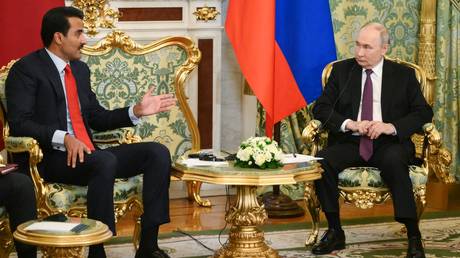 Putin and Qatari emir discuss crises in Gaza and Syria
Putin and Qatari emir discuss crises in Gaza and Syria
Both countries have played a critical role in the diplomatic outreach to Syria’s new interim government. Saudi Arabia and its Gulf neighbors have increased humanitarian aid to Damascus recent months, but the debt settlement plan will mark the first instance of Saudi financial support being directed toward the country.
Syria’s central bank governor and finance minister attended the World Bank and IMF meetings in Washington this week, marking their first participation in more than two decades.
US sanctions, which have been in place since 2004 and target supporters of Assad, remain a major obstacle to Syria securing the aid it needs for reconstruction.
Last month, the US presented Syria with a list of conditions for partial sanctions relief, according to Reuters. Among the demands, were the destruction of any remaining chemical weapons stockpiles and increased cooperation on countering terrorism.
Russia has maintained ties with Syria’s new leadership despite granting Assad asylum after his ouster.
Russian President Vladimir Putin indicated that his country is committed to helping improve Syria’s social and economic conditions, including through humanitarian aid. The new government in Damascus has also signaled its intention to preserve “strategic” relations with Moscow.
-
Site: Mises InstituteUS airstrikes on Yemen killed 95 civilians and injured 192 last week. Very little US trade requires the Suez Canal, so this is about subsidizing the State of Israel.
-
Site: Zero Hedge"Stop The Digital Control Grid..."Tyler Durden Mon, 04/28/2025 - 06:30
Via Greg Hunter’s USAWatchdog.com,
Catherine Austin Fitts (CAF), publisher of “The Solari Report,” is back to update us about the “Fast-Approaching Digital Control Grid.” (CAF) told us last time here on USAW, “There is no bigger ongoing battle for lovers of freedom than the battle taking place over the freedom killing idea of digital ID.”
But it’s more that just ID, it’s an entire control grid that is being quietly built that is like a frog being put into pot and the water being brought to a boil.
CAF explains, “You know our goal at Solari is each person has a free and inspired life. So, we have been working for several years to stop financial transaction control."
" If you get the ability to track each person and control their transactions, so if they don’t do what you say, they can turn off your money. That is game over for the Constitution and for human liberty. If you look at how the control grid is coming together, there are many different pieces. There is digital ID, all digital currency or transaction system to a social credit system to the management to certain kinds of data and back-up energy. There are many different pieces. We look at the pieces, and we look at them as one-off things such as, oh, I don’t mind having a ‘Real ID’ because I can see why they might want a federal ID, or a passport or whatever. Each one of these things looks nonthreatening and even convenient, but when they snap together, they are in a control grid, and it’s completely something else. When Trump was elected, I was shocked to see, almost immediately, the President announce the Stargate AI initiative with the mRNA vaccines, which to me is the internet of bodies.”
CAF put together a long list of Trump Administration actions that are speeding up what looks like a control grid. It’s called “The Fast-Approaching Digital Control Grid.” It lists things such as crypto friendly currency actions, private Central Bank Digital Currency, shrinking banking sector, DOGE, undisclosed Epstein files and many more red flag items that could be used to allow crime to continue and build a digital prison for “We the People.” While the Trump Administration brings change at a record pace, not a single thing has been done to find out about the “$21 Trillion Missing Money” that has been well documented by CAF and Michigan State Professor Dr. Mark Skidmore. The money has been stolen from America, and the silence about this is deafening. CAF says,
“We know there has been tremendous fraud in the financials of the US government. We know that has happened. If you look at all the things that you or I would do to figure out what had happened, where the money went and how do we get it back, that’s not what they are doing. . . . If you look at how we would do a successful operation to reengineer government and identify the real fraud and stop it, I don’t see any indication that they are doing that. I do see some selected efforts that are probably sincere. . . . They are shutting things down lots of us would like to see shut down. . . . We know how to stop the death and disabilities that come from the Covid 19 vax injection, but you go the CDC website, and they are still recommending the Covid injections.”
The massive crime going on with government accounting makes it necessary for the control grid. CAF explains, “What happened in the last Trump Administration is they adopted FASAB 56. FASAB 56 basically said they could take the books of the US government dark."
"A secret group of people, by a secret process, could remove operations from the financial statement, and they don’t have to tell people what they removed.
So, we have no idea what is in the financials. . . . This includes the big banks and contractors who do business with the government.
So, looking at the US stock market and bond market, I have no idea what is true or not. . . . We are flying blind.”
CAF still likes gold for an investment. She is also very bullish on silver as it takes about 100 ounces of silver to buy a single ounce of gold. The gold/silver ratio is at record spreads. CAF says, “At some point, the gold/silver ratio will revert to something more sensible.”
In closing, CAF says, “Everyone tell your Senator and Congressman and President Trump on X or Truth Social stop the control grid. Stop with the control grid, and we can do this. . . . If we can face it, God can fix it all.”
There is much more in the 44-minute interview.
Join Greg Hunter of USAWatchdog.com as he goes One-on-One with the Publisher of The Solari Report, Catherine Austin Fitts, as she looks ahead for what’s coming in 2025 for 4.26.25.
* * *
To Donate to USAWatchdog.com Click Here
There is a lot of free information on Solari.com.
-
Site: Real Investment Advice
The Fed removed its handcuffs on banks, allowing them greater flexibility to trade and hold crypto assets. Before Thursday's action, banks were asked to seek advance approval from the regulators before participating in crypto-related activities. Further, the Fed removed guidance that banks exercise caution with crypto due to its volatility, liquidity, and legal uncertainty.
The Federal Reserve Board on Thursday announced the withdrawal of guidance for banks related to their crypto-asset and dollar token activities and related changes to its expectations for these activities. These actions ensure the Board's expectations remain aligned with evolving risks and further support innovation in the banking system.
The Fed's move should help ease Powell's troubled relationship with Trump. It may further explain why Trump reversed his stance on firing Powell. Trump has been pushing a pro-crypto agenda. Thus, allowing banks easier access to trade and hold cryptocurrencies will go a long way toward satisfying his wishes.

What To Watch Today
Earnings

Economy

Market Trading Update
Last week, we discussed the issue with the spat between President Trump and the Federal Reserve chairman, Jerome Powell. As noted then:
“While the markets await the next Federal Reserve meeting, the uncertainty over monetary policy weighs on markets as much as the uncertainty about tariffs. This past week, the market reversed some of its gains from the massive “tariff reprieve” surge. With the MACD back on a buy signal and money flows turning positive, buyers are tepidly stepping back into the market. The 20-DMA continues to act as overhead resistance, defining the current downtrend. While there is undoubtedly a risk of another test of recent lows, which should be expected and why caution remains advisable, a break above the 20-DMA would lead to a rally to the 50-DMA. (Monday’s article addressed the “Death Cross” and what it means for investors.)“
The market rallied above the 20-DMA this past week as investors found some “silver linings” to the ongoing tariff dispute. Despite China saying “no negotiations” had started with the U.S., comments from both President Trump and Scott Bessent suggested that the Administration would “be nice” to China and that a “very good deal” could be done between the two countries. As we have noted previously, given the more extreme oversold condition of the market, any “good news” would allow investors to push stocks higher.
As stated, the market cleared initial resistance at the 20-DMA, but there is a heavy band of resistance just ahead at the level where the market was trying to bottom ahead of the tariff announcements. Just above that is the confluence of the 50- and 200-DMAs. While markets are not overbought yet, sellers will likely re-emerge if the market pushes further into those resistance levels. As we have suggested over the last two weeks, we are likely in for a rather protracted consolidation action as the market digests ongoing trade negotiations, slower economic growth, and reduced earnings expectations. Therefore, we should expect continued pullbacks and rallies until the market resolves the seller imbalances.

What is very interesting about the recent market decline is that while professional and “older investors,” who are presumably more experienced, are very “bearish” about their investment outlook, retail investors have been “buying the dip” at the most on record going back to early 2023.

However, while you may shake your head in disbelief, buying markets when they are down has been an essentially winning strategy for dip buyers over the last decade. Of course, such should be unsurprising given repeated rounds of monetary and fiscal interventions. As previously discussed, the Fed has engendered an entire generation of young investors with a sense of “moral hazard.” To wit:
“From a market perspective, the liquidity flows from the Federal Reserve increased speculative appetites and investors piled into “zombies” with reckless abandon. Why? Because of a lack of incentive to guard against risk as investors believe the Fed is protecting them from the consequences of risk. In other words, the Fed has “insured them” against potential losses.”

Will this time be different? Maybe. There will be a point where taking on excessive speculative risk in leveraged ETFs and options leads to poor outcomes. However, that may not be today. As such, we need to be mindful that buyers and sellers drive markets. Until the markets change investors’ speculative attitudes, we will likely continue to find support in markets even though we may think there shouldn’t be.

The Week Ahead
Earnings kick into full gear this week, with the most prominent companies reporting. Accordingly, earnings, revenues, and, perhaps most importantly, forward guidance will help steer the market this week. Microsoft and Meta will headline earnings on Wednesday, followed by Apple, Amazon, and Eli Lilly on Thursday. Moreover, there will be reports from companies such as Exxon, Chevron, McDonald's, Mastercard, Visa, and Coca-Cola.
Data on the labor market, inflation, and the economy will be released this week. JOLTS, ADP, and the BLS will update us on the state of the labor markets on Tuesday, Wednesday, and Friday, respectively. Any weakness may provide rationale for the Fed to cut sooner rather than later. Furthermore, GDP and PCE prices will inform the Fed on the state of the economy and prices on Wednesday. The graph below shows that the Atlanta Fed GDPNow forecasts that the economy may have contracted by 2.5%. However, the Wall Street consensus remains slightly positive.
Last week, the Fed was all over the map, from Powell's more hawkish tone to talk of a June rate cut by other Fed members. The Fed seems confused about the impact of tariffs on inflation. At the same time, they worry the economy is slowing and unemployment is rising, but they have little data to substantiate that claim. Accordingly, they appear handcuffed. Unfortunately, we won't get much insight from Fed speakers this week as they enter their media blackout before next week's FOMC meeting.

Speculator Or Investor? 10 Rules From Legendary Investors
Are you a “speculator” or an “investor”? This is an essential question that every individual deploying capital into the financial markets must answer. The reason is that how you answer that question determines how you should behave during market cycles. Over the last 15 years, due to repeated rounds of monetary and fiscal interventions, most investors are simply chasing performance. However, why would you NOT expect this to happen when financial advisers, the mainstream media, and Wall Street continually press the idea that investors “must beat” some random benchmark index from one year to the next?
However, if you are only chasing performance, are you an “investor” or a “speculator”
While some may hold a negative connotation of being called a “speculator,” that would be incorrect. However, it is critical to understand the difference, as being a “speculator” in financial markets requires a different set of “rules” than being an “investor.”

Tweet of the Day

“Want to achieve better long-term success in managing your portfolio? Here are our 15-trading rules for managing market risks.”
Please subscribe to the daily commentary to receive these updates every morning before the opening bell.
If you found this blog useful, please send it to someone else, share it on social media, or contact us to set up a meeting.
The post Banks Are Now Free To Trade Crypto appeared first on RIA.
-
Site: RT - News
Pyongyang has grown stronger since the historic summits of the previous decade, the outlet has observed
US President Donald Trump’s team is considering a new strategy for North Korea, potentially mirroring the diplomatic engagement of his first term, according to sources cited by Axios.
Trump met with North Korean leader Kim Jong-un in person multiple times, including in Singapore in 2018, Hanoi in 2019, and within the demilitarized zone on the Korean Peninsula later that same year. He is the first sitting US president ever to sit down at the negotiating table with his North Korean counterpart.
Trump has told his team that he wants to reconnect with Kim, potentially face-to-face, Axios reported on Sunday. The administration is “convening agencies to understand where the North Koreans are today,” said a senior official speaking on condition of anonymity. “A lot has changed in the last four years. We are evaluating, diagnosing and talking about potential avenues, including engagement.”
Currently, this initiative is not among the White House’s top priorities and involves consultations with external experts, including former officials and think tanks, the outlet said. Axios suggested that Washington holds less leverage over Pyongyang now than it did in the late 2010s, as North Korea has bolstered its military capabilities, including nuclear forces, and forged stronger ties with China and Russia.
Read more Kim Jong-un promises monument to heroes fallen in Kursk Region
Kim Jong-un promises monument to heroes fallen in Kursk Region
Last year, North Korea and Russia signed a bilateral treaty that includes mutual defense provisions. Shortly thereafter, Ukraine started an offensive into Russia’s Kursk Region, aiming to gain leverage over Moscow in future negotiations.
North Korean troops were deployed to Russian territory to assist Moscow in repelling Ukrainian forces, culminating in the complete liberation of the region last week, according to Moscow. Over the weekend, President Vladimir Putin acknowledged the contribution of North Korean troops, commending their bravery and referring to them as brothers in arms.
The Trump administration is seeking a compromise deal to end the Ukraine conflict. Trump has accused Ukraine’s Vladimir Zelensky of undermining his efforts by publicly challenging key aspects of what media outlets describe as his peace plan.
The two leaders met on the sidelines of Pope Francis’ funeral in the Vatican on Saturday, with Zelensky pleading for more US weapons, according to Trump.
-
Site: Fr. Z's BlogI was requested to write a prayer – in Latin – for the election of a good Successor of Peter. Oratio pro eligendo Summo Pontifice Deus Pater Omnipotens, qui in creationis initio aquas primordiales calmasti, Sancto volitante Spiritu, eundem Spiritum … Read More →
-
Site: Catholic Herald
Judgement
Early in Dostoyevsky’s masterpiece The Devils, a meeting of “incredibly vain” and well-lubricated “new men” is recalled:
“They talked about the abolition of the censorship and spelling reform…of the abolition of the army and the navy, of the agrarian reform and of the political pamphlets, of the abolition of inheritance, the family, children and the priesthood, of the rights of women…”
This passage came to my mind when I heard that our (misnamed) UK Supreme Court had ruled, in the case of For Women Scotland Ltd v The Scottish Ministers, that for the purposes of the 2010 Equality Act the term “woman” is to be restricted to biological females. Those not biologically female yet carrying a Gender Recognition Certificate (GRC) declaring them to be female will not be regarded in law as coming under the definition of “woman” with regard to the Equality Act.
That judgement is, of course, most welcome. Yet if read in full it reinforces the impression that this is merely a victory of one faction of “new men” or “new women” over another and even more extreme faction.
We learn in the judgement at paragraphs 206 and 207, in a discussion of section 12 of the Equality Act and the “protected characteristic” of sexual orientation, that:
“a person with same sex orientation as a lesbian must be a female who is sexually oriented towards (or attracted to) females, and lesbians as a group are females who share the characteristic of being sexually oriented to females. This is coherent and understandable on a biological understanding of sex.”
Allowing those with a GRC declaring them female to count as “women” would confuse the whole issue of “sexual orientation.” In the words of the judgement:
“The concept of sexual orientation towards members of a particular sex in section 12 is rendered meaningless. It would also affect the composition of the groups who share the same sexual orientation (because a trans woman with a GRC and a sexual orientation towards women would fall to be treated as a lesbian)…”
This would apparently have the dire result that,
“as well as the inevitable loss of autonomy and dignity for lesbians… it would also have practical implications for lesbians across several areas of their lives.”
Sexual Identity
Absent from the judgement is any sense that elevating a “sexual orientation” to the status of an identity which stands in need of legal protection might be part of the problem thanks to which judges must now declare solemnly that women are women and that men can’t become women by mere legal stipulation.
For if you ground the identity of a person in his/her sexual attractions, no less than in his/her maleness or femaleness, you are not giving due weight to the fundamental, bedrock importance of sexual difference and the complementarity of male and female bodies. The male or female body ceases, on this picture, to play its most profound role in our identity as persons, since its own reproductive meaning is subordinated to whatever sexual desires we happen to have. Our very bodily maleness and femaleness cease to have the normative meaning which forms part of our true identity. That meaning stands above our desires and conditions which of them – consented to and followed through on – are compatible with living out our embodied lives in a manner worthy of our created being.
How did we get here? In terms of mass social movements – as opposed to individual biographies – what grounds both T and LGB? The short answer is that by denuding sexual acts, through contraception, of their procreative and unitive reality, we began already to detach our bodies from their biological telos. Coopting our sexual powers while distorting and impoverishing our expression of our sexual nature gets us used to the idea that our biology can be suppressed at will and that our “true self” can be somehow detached from what we actually are, namely embodied persons, male and female. Gender is then seen not as a way of understanding the interpersonal nature of our actual sexed bodies, but as an arbitrary, feeling-based construct which seeks to suppress the meaning of those bodies and make them “say” something else.
Make “sexual orientation” central to defining “identity” and you have made what gets to count as fundamental not (or not merely) what we are but what we happen to desire. And if desire is now to play this central role and one that can trump the normative meaning of our embodied self, why cannot the desire to change sex or to present as someone of the opposite sex be granted the same kind of “identity status” as being same-sex attracted?
Of course, those opposed to the “T” of the LGBT movement will reply that you simply can’t change biological sex. And they are right to make this point. But neither can you turn a homosexual act into one that is marital if it is inherently incapable of forming that one-flesh procreative union which makes sense of the institution of marriage. And if your basis for identity bears no relation to the normative and nuptial meaning of your male or female body then don’t be surprised that some people will want to go a step further. They will redefine themselves in opposition to their body’s very structure – a structure whose meaning has been systematically downgraded by the very sexual revolution in which feminist/LGB gender criticism is based.
After all, we only call certain activities “sexual” because they relate in some way to our reproductive capacities, which themselves only exist because of male/female complementarity. Write this out of the picture, deny the telos of these capacities and redefine sex between same-sex couples as “uniting” them, and you have redefined sexual acts to suit human desires. The alternative is to understand some desires and acts as problematic because at war with what your embodied person normatively demands.
History and Liberty
But there is a deeper history to all of this and it relates to the history of this country and concerns liberty.
These islands have a proud tradition of liberty and we can all be said to benefit from that emphasis. It is worth remembering that one of the great achievements of Britain was the Magna Carta of 1215, which was a major step in vindicating the liberties of the people as a whole. The original charter only applied to people of a certain status but it was the Catholic Archbishop of Canterbury, Stephen Langton, who ensured, in the highly significant 1225 iteration of the Charter, that the Charter was to apply to everybody.
That year also marked the birth of Thomas Aquinas, who did much to develop the Catholic worldview on which we live in a meaning-laden, teleological and governed universe. On that view God’s creative act is also a legislative act which, in the words of Stephen Brock, constitutes “the community of the universe, all the way down to the very natures or essences of its members”. This itself “is an ‘ordination of reason, for the common good, by the one who has care of the community’”.
The eternal law constitutes the very goods and evils of created natures. Thus, “natural law has its force from God’s command, but, crucially, not solely in light of its relation to that command; for the command itself gives it an intrinsic force. Its force is its truth”. Natural law is simply the name for our participation in God’s eternal law and is naturally knowable by human beings.
The combination of protections for shared liberties with a God-centred view which took seriously the natural law which made sense of those liberties was a great blessing rich with possibilities, but things were to change.
Locke’s Revolution
The historian Eric Hobsbawm once wrote of Europe, in his Age of Revolution 1789- 1848 that, “religion, from being something like the sky, from which no man can escape and which contains all that is above the earth, became something like a bank of clouds, a large but limited and changing feature of the human firmament.” That vivid description also well describes what had been happening to the scholastic account of the order of the world and the nature of God and man in the seventeenth century of John Locke.
The scientific revolution launched a mechanistic understanding of nature which had the result of “neutralising” the domain of nature in such a way that it was no longer seen as normative. Ignoring the truth, known to all believers in essences, that we can know more than we can tell, Locke rejected the idea of intelligible natures and essences of all things and proposed that we suspend judgement on these traditional ideas and examine their foundation before accepting them. In Charles Taylor’s perceptive words:
“Locke aligns himself against any view which sees us as naturally tending to or attuned to truth.”
The task is one of demolition, not only of a normative view of nature but also of our very sense of identity. The subject takes a radical stance of disengagement from himself with a view to remaking himself. As Taylor puts it,
“To take this stance is to identify oneself with the power to objectify and remake, and by this act to distance oneself from all the particular features which are objects of potential change. What we are essentially is none of the latter, but what finds itself capable of fixing them and working on them…the real self is “extensionless”; it is nowhere but in this power to fix things as objects.”
Locke, when it comes to personal identity, does not identify the self or person with any substance, but rather makes it depend solely on consciousness, generating a radically subjectivist view of the person. Locke simply assumes that what we call consciousness can be clearly distinguished from its embodiment. Note how the meaning of the human body and the idea of human nature as normative drop out of this picture of the world.
Whereas Aquinas and Suarez believe that the foundation of morality is naturally knowable intrinsic rightness and wrongness, and understand moral obligation as involving a special form of the ethics of virtue and vice, Locke can only account for the phenomenon of moral obligation in terms of divine commands. Nature as normative is not available to him. On this picture, morality aside from divine commands which oblige us, is reduced to virtue understood in terms of mere advantage and this is an insufficient basis for moral duties. A voluntarist understanding of God, separate from an appreciation of natural law involves a downgrading of human nature and the human body as a source of moral knowledge. For morality has become not the “intrinsic” morality of Aristotle where immorality violates human nature, but rather, moral good and evil is about conformity to divine law that offers pleasure as a reward for obedience and pain as a penalty for disobedience.
It should come as no surprise that Locke claims, in his Second Treatise of Government, that “every man has a property in his own person” and that everyone has “a liberty to dispose or order freely as he lists his person, actions, possessions and his whole property” without being “subject to the arbitrary will of another”. The idea of “self-ownership” is already beset with dangerous implications and is especially liable to get out of control when moral obligation has ceased to be grounded in truths about human nature. No wonder that Locke in his radicalism makes no appeal to the ancient English constitution.
Under-emphasised by subsequent thinkers in this tradition is the fact that we ourselves can be enemies of our own liberty. Condemnations of “license” as an enemy of “liberty” did work for a while in a culture saturated in Christianity, but by weakening our appreciation of nature, the natural moral law and personal identity, Locke and his Enlightenment followers severely weakened the coherent worldview that is able to resist both “license” and a certain kind of radicalism. This radicalism developed in the twentieth century in ways which would have horrified Locke for it made fundamental “lifestyle liberties”, with little indication of what gets to count as worthy of respect other than people happening to desire certain lifestyles. Such radicalism despises limits as well as talk of the two concepts– nature and law –which not only allow us to live flourishing lives through a positive normative understanding of human nature but also give us an insight into the Creator of life and what He intended when He created Man and Woman.
Such truths about our maleness and femaleness, although naturally knowable, become distorted when distorted views of freedom and the self become part of our mental furniture.
However, resistance to them comes from various quarters: from people with otherwise very different worldviews. In her way, the Jungian therapist Lisa Marchiano sensed what was happening when confronted with the phenomenon of gender dysphoria:
“At its core, gender dysphoria speaks to a profound loss of connection with our embodied, instinctual selves… The hyptertrophied mind, cut off from its own instinctual, embodied base, disavows its connection to nature, instinct – and the unconscious. The living body has become mere clay which must be surgically and chemically altered to bring it into line with its master, the mind. Paradoxically, the symptoms of gender dysphoria may in part be an attempt of the unconscious to reassert itself and signal that something is amiss and needs our attention.”
Those words should give hope to those who wish to make alliances on these issues with those from very different backgrounds. There is much room to collaborate and this is certainly happening and bearing fruit. Yet that hope should not lose sight of the fact that the various madnesses that afflict our culture are often eloquently condemned by those who, under its spell themselves, have helped to entrench the moral and metaphysical premises which those they oppose take to their logical conclusion.

The post Judgement and Identity: How We Lost Our Grip on Nature, Liberty, and the Human Person first appeared on Catholic Herald.
The post Judgement and Identity: How We Lost Our Grip on Nature, Liberty, and the Human Person appeared first on Catholic Herald.
-
Site: Zero HedgeChinese Sellers In US Market Begin Hiking PricesTyler Durden Mon, 04/28/2025 - 05:45
President Trump's tariff war on China has forced Singapore-based Shein Group Ltd. — whose supply chain is heavily concentrated in Guangzhou, China, with over 3,000 suppliers — to raise prices on low-cost Chinese goods for American consumers. The era of China flooding the U.S. market with cheap, low-quality goods may soon come to an end.
Bloomberg reports that Shein raised the prices of all goods for the U.S. market, with markups much higher in some categories than others.
Data showed the average prices for the top 100 products in the beauty and health category jumped 51% at the end of last week. For home and kitchen products and toys, prices rose by 30%, led by a massive 377% increase for a 10-piece set of kitchen towels. Women's clothing grew by 8%.
Keep in mind these are the same cheap Chinese goods that have flooded the U.S. market over the past decade, crippling American manufacturers. The quality is often subpar, fueling America's plastic throwaway culture — not exactly the "green" future cheerleaded by climate radicals in the Democratic Party.
Shein's price hike...
In a separate report, CBS News found that nearly 1,000 products sold on Amazon — mainly sourced from China — experienced price increases in the second half of April, with the average hike around 30%, according to data from SmartScout.
Trump's 145% tariff on Chinese goods forced China-based Anker Innovations to increase the prices of mobile charging devices by over 25% in recent weeks.
The Trump administration's goal is to break America's dependence on cheap Chinese goods that have flooded U.S. markets through e-commerce platforms like Temu, Shein, and Amazon. The aim is to shift production out of China to friendlier countries (friend-shoring) — or, if the supply chain is critical (such as these), to re-shore it entirely. Fifteen years ago, there weren't hundreds of different options for Bluetooth speakers on Amazon. It's time to break America's addiction to Chinese junk.
Here's the late George Carlin on "American consumption"...
Avoid the tariffs, buy American. Very simple. Already beginning: Americans Are Searching "USA Products" Like Never Before ...
-
Site: Real Investment Advice
Despite the recent rally, the correction continues. While wanting to "buy the dip" is tempting, there has been enough technical damage to warrant remaining cautious in the near term. As we have discussed, managing risk requires discipline and the emotional ability to navigate more volatile markets until a more straightforward path for risk-taking emerges. The problem with this statement is that it often immediately gets translated to mean "being entirely out of equities," which is the act of “market timing.”
That is not what we mean by risk management. Repeated studies have evidenced that the problem with market timing is that individuals cannot successfully replicate the profitable timing of the buys and sells. However, individuals can increase and reduce exposure to risk during periods of higher volatility. This is because the most significant drawdowns tend to occur during periods of increased price volatility. As this correction continues, volatility remains relatively subdued. However, if the economy slips into a recession or some other event disrupts forward earnings expectations, there is undoubtedly a risk of a further increase.

As noted in this past weekend's #BullBearReport, remaining unemotional during volatile markets is challenging. While “buy and hold” works as a strategy during a rising bull market, it often fails during a bear market for two simple reasons: Psychology and Destruction Of Capital. This is also why Darbar's investor research annually shows that individuals always underperform the benchmark index over time by allowing “behaviors” to interfere with their investment discipline. Psychology is why “buy and hold” strategies often fail at the “first contact with the enemy.”

As is always the case, investors regularly suffer from the “buy high/sell low” syndrome.
Actual Versus Promised
Even if an individual successfully rides market volatility, the destruction of capital can have devastating consequences on financial goals. As shown below, an investor who expected a 7% “compounded rate of return” over a lifetime, as promised by “buy and hold” strategies, fell short of financial goals. This is because losing a significant chunk of capital and then getting back to even destroys the compounded return premise.

Such is why “risk management” is key for investors, especially those who employ “buy and hold” strategies.

A Simple Method
Let me repeat, I do not endorse “market timing.” Market timing is specifically being “all-in” or “all-out” of the market at any given time. The problem with market timing is consistency.
You cannot effectively time the market over the long term. Being all in or out of the market will eventually put you on the wrong side of the “trade,” which leads to a host of other problems.
However, no great investors in history have employed “buy and hold” as an investment strategy. Even the great Warren Buffett occasionally sells investments. True investors buy when they see the value and sell when value no longer exists.
While many sophisticated methods of handling risk within a portfolio exist, even a simplistic price analysis method, such as a moving average crossover, can be a viable tool to control risk. Will such a method always be right? No. However, will such a method keep you from losing large amounts of capital? Absolutely.
The chart below shows a simple analysis of the market versus a 40-week and a 200-week moving average from 2000 to the present. It is fairly evident that the 40-week moving average supports the market during bullish trends and provides resistance during bearish ones. Furthermore, when the 40-week moving average crosses below the 200-week moving average, that has occurred during more protracted bear markets. Corrections below the 40-week moving average that remain above the 200-week moving average tend to be short-lived events.

This data allows us to establish a very simplistic trading rule to manage portfolio correction risk.
- When the market is above the 40-week moving average, the portfolio is allocated 100% to equity risk.
- When the market is below the 40-week moving average, the portfolio is only 50% allocation to equity risk.
Why Not Zero
Why not reduce equity risk to ZERO? Because now we are market timing and managing risk. The problem with being at zero exposure is the lost of appreciation in the markets before the correction is deemed technically over. Furthermore, psychologically, it isn't easy to move from zero to 100% equity exposure during corrective periods. Maintaining some equity risk allows portfolios to continue to grow while mitigating severe damage to capital.
The chart shows the difference in nominal portfolio returns from 2000 to the present based on a $100 investment.

Let me restate that this is just a hypothetical example to explain the value of risk management. Improving returns over time does not require sophisticated techniques; an unemotional approach is all that is required.

The Correction Continues - Risk Management Is Needed
As the current correction continues, the market has violated the 40-week moving average. This has only happened a handful of times since 2008, namely during:
- The Euro crisis in 2012
- Brexit in 2015
- The Fed Taper Tantrum in 2018
- COVID in 2020
- Russia/Ukraine War in 2022
- And currently.

Each one of those corrections ended without a confirmed violation below the 200-week moving average, but each lasted a few months before the bull market returned. As the correction continues, the violation of the 40-week moving average puts us in the position of needing reduced equity risk in portfolios until we begin to see more bullish price action take shape.
Conclusion
Will portfolio performance lag when the market begins to recover? Yes. But as shown above, the long-term results of avoiding periods of severe capital loss will outweigh missed short-term gains.
“Anyone who followed the numbers would have avoided the disaster of the 1929 crash, the 1970s or the past lost decade on Wall Street. Why didn’t more people do so? Doubtless, they all had their reasons. But I wonder how many stayed fully invested because their brokers told them ‘You can’t time the market.”‘ – Brett Arends
There is little point in trying to catch each twist and turn of the market. But that also doesn’t mean you must be passive and let it wash all over you. It may not be possible to “time” the market, but it is possible to reach intelligent conclusions about whether the market offers good value for investors.
Providing risk management to portfolios over time has a clear advantage. The problem, as I have discussed many times previously, is that most individuals cannot manage their own money because of “short-termism.”
Despite their inherent belief that they are long-term investors, they are consistently swept up in the market's short-term movements. Of course, with the media and Wall Street pushing the “you are missing it” mantra as the market rises, who can blame the average investor for “panic” buying market tops, and selling out at market bottoms?
Yet, despite two significant bear market declines, it never ceases to amaze me that investors still believe they can invest their savings into a risk-based market, without suffering the eventual consequences of risk itself.
Despite being an unrealistic objective, this “fantasy” leads to excessive portfolio speculation, ultimately resulting in catastrophic losses. Aligning expectations with reality is the key to building a successful portfolio. Implementing a strong investment discipline and applying risk management is what leads to the achievement of those expectations.
“It does mean you that you shouldn’t let scare stories dominate your approach to investing. Don’t let yourself be bullied. Least of all by someone who isn’t telling you the full story.” - Brett Arends
The post Correction Continues – The Value Of Risk Management appeared first on RIA.
-
Site: Crisis Magazine

I was at a Barnes & Noble bookstore and a man came up to me to say, “Sorry for the loss of the blessed father.” I presume that he was not Catholic but felt because I was in a priest’s uniform that it was an appropriate gesture. I thanked him for his thoughtfulness, even though I confess I have mixed emotions about the passing of the Holy Father. Many people have reached out to me on social media…
-
Site: AsiaNews.itA Franciscan of Belgian origin, he received the cardinal's red hat on 7 December during the last consistory. The Iranian Church is a 'peripheral' reality, a small flock that is 'transparent' in its faith.Criticism of those who harbour a 'preconceived' view of a nation rich in 'contrasts'. The desire to train 'local pastors'.
-
Site: Crisis Magazine

The Gospels do not tell us precisely where the apostles went after the crucifixion, but there is some evidence that they retired to the upper room where the Last Supper had taken place. Perhaps, as we are told they did later, they locked the doors out of fear. I have been trying to do a lectio divina and place myself there to experience what was going on with the apostles. I find myself in an…
-
Site: Mises InstituteTrump's trade war is so successful that he's planning to bail out the farmers who will suffer under the trade war.
-
Site: Zero HedgeThe AI–Robotics Combo: Will All Employees Be Replaced?Tyler Durden Mon, 04/28/2025 - 05:00
Authored by Anders Corr via The Epoch Times,
On April 14, a local government administrator in the United States sent my relative a letter that she suspected of including artificial intelligence (AI) content. Sure enough, an AI detector found 83 percent generated by AI GPT.
She said it was the best letter she had ever received from a politician—and she writes to her representatives frequently. She praised the letter for responding to every single point she raised in her own letter, something no unaided politician had ever done.
We toyed with the idea of confronting the administrator publicly. If AI wrote a better letter than the administrator himself, perhaps he could be replaced with the technology, and his salary redeployed for more substantive taxpayer benefits. It was a tongue-in-cheek idea. But the logic is nevertheless disturbing.
If artificial intelligence is now better than one politician for one task, according to one constituent, is it plausible that in 10 or 20 years, AI could be better than all politicians for all their tasks, according to most constituents?
At that point, voters might just vote for an AI politician rather than a human one. Human politicians are, after all, time-constrained by their need to sleep, eat, and hobnob with their elite donors and other benefactors.
My relative decided not to confront the politician at his next public meeting. She wants to influence his decisions in the future, and public shaming is probably not the best way to do this. So he gets a pass to continue using AI on unsuspecting constituents. Even his tiny hold on power at the local level protected him from the truth.
If he can get away with it, perhaps many other politicians are doing the same. This empowers AI-using politicians at the expense of the old-fashioned types who simply do not have enough time to respond to every point of every letter of every constituent, but try anyway. AI politicians then gain an advantage in the next election, and over time, due to natural selection, all politicians will use AI, as those who don’t get voted out.
The United Arab Emirates (UAE), a small autocratic country in the Middle East, is already way “ahead” of this slow “democratic” transition to AI. In a world first, the UAE is using AI to both track the effects of existing legislation and write drafts of new legislation. Presumably, the president of the UAE will review the legislation prior to enacting it. Let’s hope so, as there would then be at least one human in the loop.
The UAE considers using AI to write legislation to be 70 percent more efficient than relying on human legislators to write laws. How that remarkably round number was arrived at is unclear. But as UAE citizens cannot vote, they could essentially become forced laborers working not only for the president of the UAE but also for AI, given that nobody understands exactly how AI comes up with its recommendations.
Now, consider expanding this to everything. A new startup in Silicon Valley, called Mechanize, audaciously wants to use AI to automate all jobs. The startup, launched on April 17, expects to start replacing white-collar jobs, such as those of accountants, lawyers, and authors (full disclosure: this author is an author, so may be biased in favor of humans).
But the company also envisions pairing AI with robots to mechanize other jobs, for example, in agriculture, construction, and manufacturing. Companies like Waymo, Zoox, Tesla, and Lyft are already well on their way to populating our streets with robotaxis that could eventually lead most of us to dump our cars, perhaps in compliance with a government fiat written by AI.
That the military could also be automated, despite the promises of AI companies to do no such thing, is obvious given the rise of armed drones on the battlefields of Ukraine, and the interest of the U.S. and Chinese militaries in matching AI with drone warfare. One reason the United States denies the fastest AI semiconductors to China is that they are needed for the small AI devices onboard military drones that must learn from the adversary’s strategies mid-flight. The drone that learns the fastest and adapts its tactics to enemy drones before returning to base will survive.
The Israel Defense Forces reportedly used AI to target as many as 37,000 Hamas and Palestinian Islamic Jihad (PIJ) suspects with a 90 percent accuracy rate. This was paired with some “acceptable” level of civilian casualties per target to arrive at those approved for aerial bombing, with not-too-accurate dumb bombs. AI saved a lot of time for the targeters, though.
Communists have long promoted the idea of full mechanization to “free” humans of the need to labor. In their “utopian” schemes, full mechanization would allow humans the free time to pursue whatever they want, including leisure, art, and family. With the rise of mechanization, automation, robots, and AI, a new utopianism is coming that will appeal to the “Silicon Valley proletariat” of coders, programmers, and other tech workers.
With AI, this coming “tech vanguard” can seek an AI communism, in which humans frolic in nature while being watched over by the machine. It sounds dystopian and easily manipulable by Leninists if not Stalinists. But its rosy-glassed adherents will see it the other way around. They have likely read Richard Brautigan’s 1967 poem envisioning a “cybernetic ecology”:
where we are free of our labors and joined back to nature, returned to our mammal brothers and sisters, and all watched over by machines of loving grace.
Brautigan was not specifically communist, though he was counter-culture.
In the mid-2000s, a British movement developed a concept similar to being “watched over by machines of loving grace” that would become known as “fully automated luxury communism.” It was described by The Guardian in 2015 as “an opportunity to realise a post-work society, where machines do the heavy lifting and employment as we know it is a thing of the past.” This was before AI became popular. With AI, even the white collar workers will be “free.”
AI is being touted, by even those who know its dangers more than others, as a carrot and stick, a necessary evil, like nuclear weapons, in the competition with China. This could be considered an “anti-communist” or “anti-authoritarian” use of AI. The idea is that, if the United States does not deploy the most sophisticated AI to both entice Beijing to reform, and deter Beijing from attack, market democracy could be at a disadvantage.
In any conflict that occurs, Beijing will certainly deploy all technologies at its disposal. This puts those who would prefer to go slowly and carefully, or avoid any future of AI, in a bind. Use AI fire to fight fire, or not? And what if the fire blows back on the freedom of the individual in a market democracy, after burning the authoritarian adversary?
Handing over so much power, up to and including “AI communism,” whether in the form of political power to legislate or industrial power that replaces trillions of dollars worth of human labor, is an immense concentration of power in the hands of whoever controls AI. That could be a dictator, an oligarchy, an elected official who accrues too much power, or a hacker. It could even be AI itself, if it goes rogue or is irretrievably granted that power at some point in the future.
The advent of AI is likely a disaster for human agency, especially if it later develops malign rather than benign attitudes toward humanity. A benign AI is in no way guaranteed if we relinquish power to an immensely powerful technology that even its creators do not fully understand, and are not confident they can control.
Views expressed in this article are opinions of the author and do not necessarily reflect the views of The Epoch Times or ZeroHedge.
-
Site: AsiaNews.itThrough tax breaks and the commissioning of new small hydroelectric power plants, the government in Bishkek is resolutely pursuing a path of ecological transition. This will bring significant benefits for businesses, but doubts remain about the impact on the behaviour of individual citizens.
-
Site: AsiaNews.itToday's news: US raids hit detention centre in Yemen, at least 68 dead; Israel bombs Gaza and Beirut, despite ceasefire;Tensions between Beijing and Manila in the South China Sea over claims to small sandbanks;Fourth night of artillery fire on the border between India and Pakistan; Pyongyang claims credit for its soldiers on the front lines in Ukraine.
-
Site: Crisis Magazine

May the Lord in His infinite mercy look upon the prayers, tears and sacrifices of all true Catholics who love our Mother Church, who in these days humbly and confidently implore the infinite Mercy of God to grant us a new Pope, who burning with the zeal for the glory of Christ and the salvation of souls, will “strengthen the brethren in faith” (Luke 22:32), being uncompromisingly faithful to his…
-
Site: RT - News
The two countries’ top diplomats continued “a productive exchange of opinions,” the Russian Foreign ministry has said
US Secretary of State Marco Rubio and his Russian counterpart Sergey Lavrov held a phone call on Sunday, in which they stressed the importance of further efforts to settle the Ukraine conflict, Moscow’s Foreign Ministry has said.
The top diplomats from the two nations continued a “productive exchange of opinions on key aspects of the Russian-American political dialogue, which has significantly intensified recently,” the ministry said in a statement on Monday.
The main topic of discussions between Lavrov and Rubio was the Ukraine crisis, the statement read.
“The minister and the secretary of state emphasized the importance of consolidating the emerging prerequisites for starting negotiations in order to agree on a reliable path to long-term sustainable peace” between Moscow and Kiev, it said.
Other international issues have also been addressed, and both sides have agreed to continue contacts at all levels, the Russian Foreign Ministry added.
Read more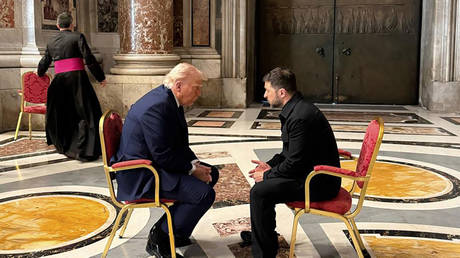 ‘Calmer’ Zelensky requested ‘more weapons’ in Vatican – Trump
‘Calmer’ Zelensky requested ‘more weapons’ in Vatican – Trump
During his appearance on NBC News’ Meet the Press on Sunday, Rubio stressed that the upcoming week is expected to be “very critical” for the White House with regard to the Ukraine peace process, as it is trying to make a “determination about whether this is an endeavor that we want to continue to be involved in.”
Washington does not want to walk away, but it also does not want to “spend time on something that is not going to get us there” either, he said. “There are reasons to be optimistic, but there are reasons to be realistic. We are close, but we are not close enough,” the Secretary of State added.
US President Donald Trump, who met with Vladimir Zelensky on the sidelines of Pope Francis’ funeral on Saturday, said that the Ukrainian leader was “calmer. I think he understands the picture. And I think he wants to make a deal. I do not know if he wanted to make a deal [before]. I think he wants to make a deal.”
READ MORE: New sanctions on Russia would mean two more years of war – Rubio
Kremlin press secretary Dmitry Peskov reiterated Moscow’s readiness to engage in talks with Kiev without preconditions. The issue was raised by Russian President Vladimir Putin during his meeting with Trump’s special envoy, Steve Witkoff, in Moscow on Friday, he said.
-
Site: Zero HedgeA CIA Director's Son Joined Russia's Army To 'Defeat The Military-Industrial Complex' & Was Killed In UkraineTyler Durden Mon, 04/28/2025 - 04:15
Russian as well as independent regional media sources have revealed that a high-ranking CIA official's son was killed while fighting alongside Russian forces in Ukraine last year.
The news and story of the young man's death is highly unusual, given his mother is a US intelligence information warfare and 'disinfo' expert: the CIA’s Deputy Director for Digital Innovation Juliane Gallina Gloss.
 Michael Gloss in Moscow’s Red Square before he reportedly joined the Russian army, via IStories
Michael Gloss in Moscow’s Red Square before he reportedly joined the Russian army, via IStories
The New York Post among other US media outlets described the CIA official's son, a longtime global traveler and activist, as having been 'radicalized' against the US and its foreign policy.
Michael Alexander Gloss, 21, died on April 4, 2024 - based on a family obituary posted by a funeral home in Fairfax, Virginia - but on Friday investigative outlet IStories reported that Russian authorities only informed his family of his death in October. His official obituary only related that he was "tragically killed in Eastern Europe."
IStories apparently had access to his phone records, given that it published a live recording of Gloss informing his parents that he traveled to Russia, along with many photos including showing life in a Russian barracks with fellow soldier friends who appear to be foreign fighters.
Juliane Gallina Gloss has been the CIA's deputy director for digital innovation since being appointed in February 2024, and is a career CIA and US Naval intelligence officer.
It is reported that the son of CIA deputy director Julianne Gallina Gloss, 21-year-old Michael Gloss died in Ukraine as a Russian soldier. He signed a contract with Russia’s MoD. His father, Iraq vet Larry Gloss, develops secure software for U.S. and NATO forces pic.twitter.com/HmMyAnym5N
— WarTranslated (@wartranslated) April 25, 2025Among the more interesting parts of the story is how the young man wanted to "defeat the military-industrial complex":
In the same message, Michael vaguely described his future in which he would “defeat mortality and the military-industrial complex:” “I find myself more and more alive by the minute. Hungry for blood and glory. And basking in the pleasure of knowing that it all is still to be done... But as of now. I might have just incarnated in time to defeat mortality AND the military industrial complex.”
When asked exactly how he plans to defeat the military-industrial complex, Michael replied: “If I told you my real plan you wouldn’t believe me anyway.”
The Amsterdam-based Moscow Times writes that "Gloss was one of more than 1,500 foreign nationals from 48 countries listed in the leaked recruitment database since Russia’s invasion of Ukraine in 2022."
The highly detailed IStories Russian investigative report begins below...
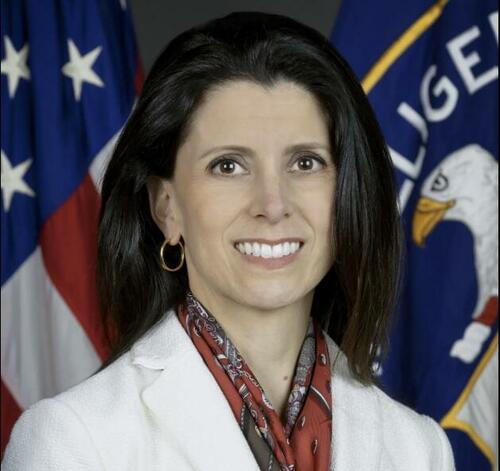 Via CIA/US gov website: Juliane Gallina Gloss was named the CIA’s deputy director for digital innovation in February 2024.
Via CIA/US gov website: Juliane Gallina Gloss was named the CIA’s deputy director for digital innovation in February 2024.
In a video, a thin young man with long hair tied in a messy bun carefully releases three tiny chicks from a box onto the grass. A tattoo of a peace sign — the emblem of the anti-war movement — is visible on his finger.
“We found some baby chicken in the [Turkish] local market and Itthobaal had the idea to get a few of them and maybe he will travel with them. He bought maybe three or four chickens and put them in a nice little box with straw and everything he could find. But the next one of the chickens died and the second one too. He was quite sad about it and felt very stupid that he had this dream of a whole journey together with this little new family.”
A year later, Itthobaal — one of the many names that 21-year-old American Michael Gloss used to introduce himself — signed a contract with the Russian Defense Ministry and died in Ukraine. IStories has reconstructed his final route.
This is the story about how a young anti-fascist, environmental activist and women’s rights advocate from the family of a CIA deputy director dreamed of traveling light around the world, but ended up in the Russian army.
Michael Gloss is one of more than 1,500 foreigners who passed through the Russian military recruitment center during the war in Ukraine, whose identities were established by IStories.
 IStories: Gloss put a photo taken at the regiment’s base on his avatar in his Odnoklassniki profile. Photo: Odnoklassniki
IStories: Gloss put a photo taken at the regiment’s base on his avatar in his Odnoklassniki profile. Photo: OdnoklassnikiRead the full detailed report here.
-
Site: RT - News
The Ukrainian leader has repeatedly insisted he would never formally recognize the peninsula as Russian territory
US President Donald Trump has said he believes Ukraine’s Vladimir Zelensky has come to terms with the need to recognize Crimea as part of Russia in order to achieve peace with Moscow.
Zelensky has repeatedly insisted he would never formally recognize Moscow’s control over Crimea, which became part of Russia in 2014 afollowing a referendum held in the aftermath of a bloody Western-backed armed coup in Kiev.
Trump, who met with the Ukrainian leader on the sidelines of Pope Francis’ funeral at the Vatican on Saturday, was asked by journalists aboard Air Force One on Sunday if Zelensky was now prepared to “give up” the peninsula.
”Oh, I think so, yeah,” the US president replied.
Trump said the tone of his latest exchange with Zelensky was markedly different compared to the “little dispute” they had at the Oval Office in February.
Read more ‘Calmer’ Zelensky requested ‘more weapons’ in Vatican – Trump
‘Calmer’ Zelensky requested ‘more weapons’ in Vatican – Trump
Back then, the Ukrainian leader’s meeting with Trump and US Vice President J.D. Vance turned into a shouting match in front of the cameras and led to Zelensky’s visit to the White House being cut short.
”I see him [Zelensky] as calmer. I think he understands the picture. And I think he wants to make a deal. I do not know if he wanted to make a deal [before]. I think he wants to make a deal,” the president stated.
Trump said Zelensky had told him “that he needs more weapons, but he has been saying that for three years.” The US president noted that Kiev is in a “very tough situation” and is fighting “a much bigger force.”
He also called on Russian President Vladimir Putin to “stop shooting, sit down and sign a deal” to end the fighting.
Moscow has said on numerous occasions that it is ready to begin talks with Kiev without any preconditions. However, Kremlin spokesman Dmitry Peskov noted on Monday that so far Russia is not seeing any steps from Ukraine that would signal its eagerness to start negotiating.
READ MORE: Moscow unveils details of latest contact with US
Russian officials have emphasized that any viable long-term settlement must address the root causes of the conflict and reflect the territorial realities on the ground, including Moscow’s control of Crimea as well as of the People’s Republics of Donetsk and Lugansk and Kherson and Zaporozhye regions.
-
Site: Mises Institute
-
Site: Mises InstituteTom DiLorenzo, Tom Woods, and Robert Malone meet in Phoenix to expose how state power, psychological operations, and public health "experts" use bureaucracy as both a weapon and a weakness.
-
Site: Mises Institute62% think tariffs will be a net liability in the long run. Even more think it will be costly in the short run. They're right because tariff hikes are just tax increases on Americans.
-
Site: Mises Institute"Modern medicine looks more like a religion than a science—and its priests are bureaucrats."
-
Site: Mises Institute"In government, failure is success—and the worse you do, the more money you get."
-
Site: Mises Institute"Bureaucracies never had to prove they helped—they only had to follow the rules and demand obedience."
-
Site: Zero HedgeRat Infestation Disrupts UK Nuclear Plant ConstructionTyler Durden Mon, 04/28/2025 - 03:30
Authored by Felicity Bradstock via OilPrice.com,
-
Workers at the Hinkley Point C nuclear power plant construction site in the UK have reported a significant rat infestation, raising health and safety concerns.
-
The rat problem is causing disruption to the major energy project and prompting calls for immediate action from trade unions to address the issue.
-
Despite assurances about the safety of nuclear power plants, this incident highlights challenges and public perception issues related to nuclear facilities.
The U.K. has ambitious nuclear power plans and is developing several small- and large-scale projects. While opposition, high costs, and other factors have slowed development in the past, EDF has been facing another problem at its Hinkley Point C construction – a rat infestation.
In early April, the Unite and GMB trade unions for workers at Hinkley Point C in Somerset, in the south of England, informed the developer, French energy giant EDF, that the facility was overrun with rats. The unions said that immediate action was needed as the rodents were “everywhere” and the rapidly expanding rat population prompted health and safety concerns for the workforce.
One source reported, “They’re all over. You see them just sat there, looking at you. It is worse near the canteens, where I guess it started. But they are everywhere now.” Another source said, “The more men working on the site, the more rubbish on the site – and the canteens are not clean either. It has just become worse over time.”
The development of Hinkley Point C is expected to support the creation of 15,000 jobs. Once complete, the plant is expected to power around 6 million U.K. homes and contribute 7 percent of the country’s electricity needs. It is planned to launch in the early 2030s, following several years of delays and spiralling costs. However, many believe this is an unrealistic aim. In recent months, workers have complained about poor working conditions and low pay, potentially because of EDF’s financial pressures. Hundreds of project staff also went on strike in November over the inadequate security access to the site.
A Hinkley Point C spokesperson said, “As is common across all large construction sites, there will be occasions when the presence of vermin is noted. A specialist company has carried out a survey and measures are in place to address the issue. We are committed to working alongside our trades union partners to provide the best environment for all of our workers.”
Even though the U.S. government has previously assured the public that the TV show The Simpsons was wrong about potential rat infestations, this is not the first time the problem has been seen in recent years. The U.S. Department of Energy published an article in 2018 aiming to debunk several nuclear myths. It stated:
“Nuclear power plants are well-maintained.
The Springfield plant is notorious on the show for its safety violations. They range from rat infestations and cracked cooling towers (held together with chewing gum) to leaky pipes that spill out radioactive waste.
This simply does not happen. The nuclear industry is one of the safest to work in and to live near.”
However, rat problems have been seen in the past, such as during the Fukushima 2013 power cut. In March 2013, the Tokyo Electric Power Co (Tepco) suspected that rats may have caused a short circuit in a switchboard, triggering the power cut. Tepco announced that it had found burn marks on a makeshift power switchboard and a 15 cm dead rodent nearby. The outage shut down cooling systems for four spent fuel ponds at reactors 1, 3 and 4, however cooling to the reactors was not affected. Following the incident, engineers spent around 30 hours repairing the damage. This came just two years after a giant earthquake-triggered tsunami caused meltdowns at the plant, which was in the decommissioning stage during the rodent incident.
Despite the rodent infestation in the construction phase of Hinkley Point C and during the decommissioning period of Fukushima, rats are, indeed, not a common sight in nuclear power plants thanks to the enforcement of strict safety regulations. For decades the public perception of nuclear power has been negative, due to three separate nuclear disasters – Chernobyl, Three Mile Island, and Fukushima. However, nuclear experts have repeatedly tried to reassure the public that nuclear power is one of the safest forms of energy.
The International Atomic Energy Agency says nuclear power plants are among “the safest and most secure facilities in the world”, as they are subject to strict international safety standards. The World Nuclear Organisation reminds us, “In the 60-year history of civil nuclear power generation, with over 18,500 cumulative reactor-years across 36 countries, there have been only three significant accidents at nuclear power plants.” While these incidents stuck in the minds of people worldwide, this ratio is extremely low when compared to other forms of energy.
Rigorous international standards and regulations, as well as significant improvements to nuclear technology, have helped make nuclear power one of the safest forms of clean energy production. As the public perception of nuclear energy begins to shift to more positive, and countries worldwide look for ways to support a transition away from fossil fuels to green alternatives, we can expect to see a massive nuclear renaissance in the coming years.
-
-
Site: Mises InstituteProfits aren’t immoral—they’re necessary. Just as organisms need a net energy surplus to live, societies need profits to sustain themselves.
-
Site: RT - News
A British watchdog has criticized the biotech firm over recruitment practices involving children in coronavirus booster studies
US ’big pharma’ company Moderna could be suspended or expelled from a UK trade body after breaches of industry rules, including offering children cash and teddy bears to take part in Covid vaccine trials, The Telegraph has reported.
Moderna, which joined the Association of the British Pharmaceutical Industry (ABPI) in 2023, now faces an audit that could result in its suspension or expulsion. A new ruling is expected to be published in the coming days, according to The Telegraph. If sanctioned, it would become the tenth firm to face suspension from the ABPI in the past 40 years, the newspaper wrote.
The UK’s drug watchdog, the Prescription Medicines Code of Practice Authority (PMCPA), said Moderna’s lack of transparency was "unacceptable" and damaged the industry’s reputation.
In October 2024, Moderna was fined £14,000 ($17,850) after a WhatsApp message offered £1,500 ($1,872) to minors to join the NextCOVE Covid booster trial. Although the company later reduced the payment to £185 ($231), at least one site continued promoting the original offer. The PMCPA said the payment was “much higher than would be considered a reasonable reimbursement” and ruled that it discredited the pharmaceutical industry.
Read more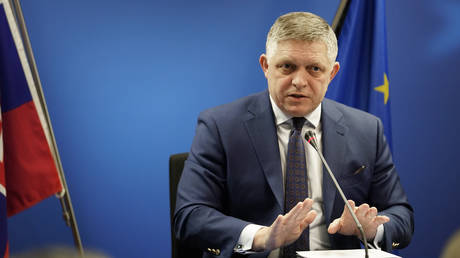 EU state’s PM issues Covid vaccine warning
EU state’s PM issues Covid vaccine warning
In a separate case, Moderna was fined nearly £44,000 ($56,000) after Britain’s pharmaceutical watchdog found it had damaged the industry’s reputation. In 2023, Bradford Teaching Hospitals NHS Foundation Trust published adverts aimed at children aged 12 and over, offering “a lovely certificate and a ‘be part of the research’ teddy bear.” Two online articles also promoted recruitment.
A senior Moderna employee co-authored promotional articles, including one with former vaccines minister Nadhim Zahawi, without disclosing his affiliation, the Telegraph reported. The employee also sent promotional tweets without revealing his role.
The PMCPA said Moderna “misled regulators” about when it learned of the breaches. While the company claimed it acted promptly after being informed in January 2024, evidence showed executives had been alerted by UsForThem in August 2023.
The findings showed “how readily [Moderna] put profit ahead of the health and safety of children” and “laid bare just how little regard it has had for the regulatory system that was supposed to keep it honest,” Molly Kingsley, founder of UsForThem, told the newspaper.
COVID-19 vaccines, including Moderna’s Spikevax, may lead to side effects in minors, such as pain at the injection site, fatigue, headache, fever, and, in rare cases, myocarditis or pericarditis, according to health authorities.
-
Site: RT - News
Suspect Kai-Ji Adam Lo has been charged with murder after the deadly vehicle attack at the Lapu Lapu Day celebration
The death toll from the car-ramming attack at a Filipino festival in the Canadian city of Vancouver on Saturday has risen to 11, police have said.
The suspect, Kai-Ji Adam Lo, 30, has been charged with eight counts of second-degree murder, with additional charges expected as the investigation continues.
The incident occurred around 8:14pm near East 41st Avenue and Fraser Street, as the Lapu Lapu festival was concluding and barriers were being removed.
Witnesses said a black SUV accelerated into the crowd, causing mass casualties. Bystanders detained the suspect before police arrived.
The victims ranged in age from five to 65 years old, according to interim police chief Howard Rai. Thirty-two patients were treated at hospitals across the Lower Mainland, with 17 still hospitalized, some critically, the provincial Ministry of Health confirmed.
Read more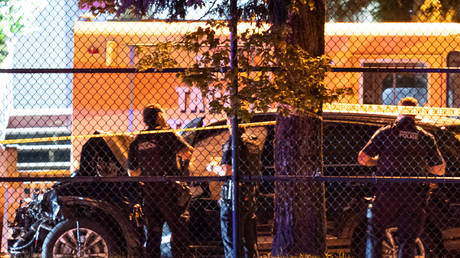 Car rams into crowd in Canada (VIDEOS)
Car rams into crowd in Canada (VIDEOS)
Lo, a Vancouver resident, reportedly has a documented history of mental health issues. According to the Vancouver Sun, his family contacted a hospital psychiatric ward seeking help for him just hours before the attack. He was believed to be suffering from delusions and paranoia. Police stated that the incident is not being investigated as terrorism-related.
Last year, Lo’s brother, Alexander, was murdered in Vancouver. Following his brother’s death, Lo wrote about his grief and his mother’s suicide attempt on a fundraising page.
The suspect appeared in court on Sunday, did not request bail, and remains in custody. His next court appearance is scheduled for May 26.
Police have established a 24-hour assistance center at Douglas Park Community Centre for families of victims.
The Lapu Lapu Day festival honors a Filipino hero who resisted Spanish colonization. Organizers said the Filipino community would show “true resilience” following the tragedy.
-
Site: The Unz ReviewNews this week that Elon Musk will soon be departing his “Department of Government Efficiency” (DOGE) is a grim reminder of what happens when you challenge big spending DC. Unfortunately, the lesson once again is that when you challenge the empire, the empire eventually strikes back. President Trump rode into office with the help of...
-
Site: The Unz ReviewLast month the Trump Administration launched an unprecedented assault against academic and intellectual freedom in America, targeting many of our most elite institutions of higher education. As an example of this, enormous pressure was exerted against Columbia University in New York City by withdrawing $400 million in annual federal funding and demanding its full cooperation...
-
Site: The Unz ReviewAll of Kellogg’s underlying assumptions lacked any basis in reality. Yet Trump seemingly took them on trust. Political warfare in Washington is endemic. But the body count at the Pentagon has started to rise precipitously. Three of Secretary of Defence Hegseth’s top advisors were placed on leave, and then fired. The war continues, with the...
-
Site: AntiWar.comUkrainians may remember two days that just passed as two of the worst days in their history. It has been evident since long before Donald Trump and JD Vance were elected that the war in Ukraine would one day end with a diplomatic settlement that was based on, and looked much like, the diplomatic settlement … Continue reading "Ukraine’s Worst Day: Zelensky Rejects Trump’s Peace Plan"
-
Site: The Unz ReviewThe question is simple: The white race, yes or no? By the end of this century, whites will be on track to becoming minorities in almost all our historic homelands, even within Europe. The majority of births in the United States are already to non-whites. This shift will have major political, economic, religious, and cultural...
-
Site: The Unz ReviewThe nations of Scandinavia, until recently, were idealised as modern, progressive places to live. Their highly educated populace embraced liberal values and eschewed ethnocentric patriotism to open their doors to immigrants, particularly Muslims. They had nothing but token armies, which pursued diversity and equality policies. Pacifism no more: Sweden and Finland, after decades of neutrality,...
-
Site: AntiWar.comHere is yet another example of stunningly craven journalism from the Guardian, entirely illustrative of what is going on across the British establishment media in its coverage of Israeli war crimes in Gaza for the past 18 months. We are now a month on from Israel executing 15 paramedics and hiding their bodies in a … Continue reading "How Is the Media Still Getting the Gaza Murdered Paramedics Story So Wrong?"
-
Site: The Unz ReviewThe nerds who brought us the digital revolution did so without any thought to the obvious consequences. Americans addicted to scrolling their cell phones and enjoying social media are suffering from the numerous threats that the digital revolution brings to them. Not just government spying on them and, if government wishes, setting them up for...
-
Site: RT - News
The US president believes Kiev is closer to reaching a deal with Moscow than before
US President Donald Trump has said Ukraine’s Vladimir Zelensky was “calmer” during their meeting in the Vatican at the weekend and seemed more open to making a deal with Moscow than during their infamous encounter in the Oval Office.
Speaking to reporters before boarding Air Force One on Sunday, Trump said the tone of his latest discussion with Zelensky was markedly different from their “little dispute” in February, which saw the Ukrainian delegation kicked out of the White House.
“I see him as calmer. I think he understands the picture. And I think he wants to make a deal. I don’t know if he wanted to make a deal [before]. I think he wants to make a deal,” Trump said.
Earlier this week, Trump told Time magazine that “Crimea will stay with Russia” under any peace agreement, noting that even Zelensky “understands” the reality, despite public declarations to the contrary. Asked whether he believed Zelensky was now prepared to “give up” the peninsula, Trump responded: “Oh, I think so, yeah.”
Read more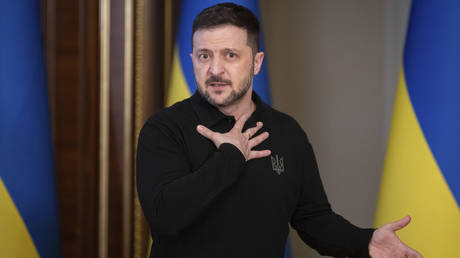 Zelensky demands ‘at least’ Israel-style support from US
Zelensky demands ‘at least’ Israel-style support from US
Zelensky has repeatedly and publicly insisted that Kiev would never formally recognize Crimea as Russian territory – a position Trump has previously criticized as “very harmful to the peace negotiations.”
Despite portraying Zelensky as someone who wants to do “something good for the country,” Trump revealed that the Ukrainian leader again asked Washington for more military support.
“He told me that he needs more weapons, but he has been saying that for three years,” Trump stated. The US president noted that Kiev was in a “very tough situation,” fighting “a much bigger force” — and emphasized that “it helped them when we gave them $350 billion worth of weapons or cash.”
Read more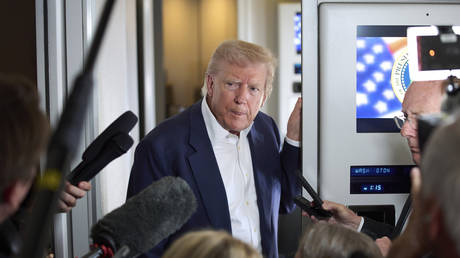 Zelensky contradicts Trump on deal with Russia
Zelensky contradicts Trump on deal with Russia
“He needs more weapons, and we are gonna see what happens with respect to Russia,” Trump added, noting that he was “disappointed” with Moscow’s renewed strikes in Ukraine.
Following a brief lull in fighting during the Easter ceasefire announced by President Vladimir Putin last weekend, the Russian military carried out multiple long-range strikes against Ukrainian military and industrial targets over the past week. Moscow has maintained that it targets only military installations and facilities used by Kiev’s forces, rejecting accusations of deliberately striking civilian sites.
Moscow has also reiterated its readiness for discussions with Kiev without preconditions. Kremlin spokesman Dmitry Peskov confirmed that the issue was raised during a meeting between President Putin and Trump’s special envoy, Steve Witkoff, on Friday.
READ MORE: Moscow ready to seek ‘balance of interests’ with Ukraine and US – Lavrov
Russian officials have emphasized that any viable long-term settlement must reflect the territorial realities on the ground and address the root causes of the conflict. According to multiple reports, Washington’s proposal seeks to freeze the conflict along the current front lines and recognize Crimea as part of Russia. However, Russian Foreign Minister Sergey Lavrov said that – unlike Zelensky – Moscow does not intend to discuss confidential details of talks with the US until the process is completed.
-
Site: Euthanasia Prevention CoalitionAlex Schadenberg
Executive Director, Euthanasia Prevention Coalition
An article published in the Toronto Sun on April 25 and written by Brian Passifiume concerns David Baltzer, a Canadian veteran who was offered euthanasia instead of medical treatment in December 2019.
Baltzer, a two tour Afghanistan combat veteran with the Princess Patricia’s Canadian Light Infantry (PPCLI,) told the Toronto Sun that:
he was offered MAID in Dec. 23, 2019 — possibly making him among the first Canadian soldiers offered therapeutic suicide by the federal government.
“It made me wonder, were they really there to help us, or slowly groom us to say ‘here’s a solution, just kill yourself,”The Toronto Sun reported Baltzer as saying:
“I was in my lowest down point, it was just before Christmas,” he told the Sun.
“He says to me, ‘I would like to make a suggestion for you. Keep an open mind, think about it, you’ve tried all this and nothing seems to be working, but have you thought about medical-assisted suicide?'”Baltzer said that the suggestion left him reeling. Passifiume reported that Baltzer was offered treatment for PTSD (post traumatic stress disorder) after returning from Afghanistan. The treatment was unsuccessful. Baltzer then turned to alcohol and substance abuse to deal with his trauma. Passifiume reported that:The story first came out when when he was interviewed by CAF veteran Mark Meincke, whose trauma-recovery podcast Operation Tango Romeo broke the story.
Meincke said Baltzer’s story shoots down VAC’s assertions blaming one caseworker for offering MAID to veterans, and suggests the problem is far more serious than some rogue public servant.
“It had to have been policy. because it’s just too many people in too many provinces,” Meincke told the Sun.Meincke and Baltzer are calling for a complete reform of the Veterans Affairs.
Meincke said that he knows at least 5 veterans who were offered MAiD by veterans affairs.More articles on this topic: -
Site: Euthanasia Prevention CoalitionThis article was published by Kelsi Sheren on her substack on April 25, 2025.Big shocker Veteran’s Affairs is at it again, the Canadian government, since 2022, is failing our veterans in the most disgusting and disgraceful way possible: by offering them death care instead of healthcare! But Kelsi?! didn’t they say they aren’t doing that anymore?? Yes they sure did, once again Liberal lies. Are we surprised honestly?
In a chilling repeat of a disturbing trend, another Canadian combat veteran has been offered medically assisted suicide (MAiD) instead of genuine support and treatment. My question is when did ending lives become an acceptable, even routine, solution for our veterans suffering from trauma, PTSD, or any other physical and mental health challenges? When did offering death become an easier alternative than providing the comprehensive care our veterans desperately deserve, care we know exists but are unwilling to use or fund.
Veterans, in my opinion deserve compassion, proper treatment, respect, dignity, and unwavering support, but thats just me I guess. We should NEVER be offering an off-ramp to the grave. This continues to be a disturbing, even horrifying trend that not even the Veteran Affairs Minister is aware of. To think that some government case managers, those specifically entrusted with the sacred duty of caring for our veterans, would even contemplate suicide as an option rather than investing the necessary time, resources, and genuine effort into authentic healing and recovery is insane. Our veterans fought and continue to fight for life and liberty and now for their own country to later suggest ending their life. This is one of the dangers on continuing to talk about MAiD as some “life saving amazing program!”
This story, not one we haven’t heard before but were promised would “never happen again” to a sinister and growing pattern, the Liberal government is a profound failure on several fronts. Failing in its moral, ethical, and basic human obligations to protect and care for those who willingly put their lives on the line for our freedoms. I do love how they continue to want to send us to other countries to fight, while pulling this bullshit and asking.. why are retention rates so low?! How could that be?!
What they should be asking themselves is how can we possibly trust a system that suggests death as a viable, acceptable solution? The very thought undermines the trust veterans and their families should rightly place in their government and healthcare system.
So, what can we do to rectify this continued failure? Fire everyone? Restart?
First, a good place to start would be to stop selling veteran’s out to Manulife Insurance and ACTUALLY support them! Next, there must be absolute, unequivocal accountability at every level. (Which we know won’t happen, but hey I’m just a combat veteran who is preaching accountability, something this government knows absolutely nothing about”
Case managers should never, under any circumstances, be authorized or empowered to suggest medical suicide. These case managers need to be made examples of because in 2022 when they were caught the first time, not a damn thing was done.
Counselling suicide should be crystal clear, explicitly stated in operational guidelines, and communicated with zero ambiguity. The word is NO! WE NEVER SUGGEST SOMEONE DIES instead of helping them. Next I would implement mandatory, rigorous oversight and thorough mental health training programs specifically designed around trauma-informed care, ensuring that case managers fully understand their critical role in protecting, preserving, and supporting veterans' lives.
Additionally, complete transparency in reporting any incidents or breaches is non-negotiable, alongside swift and public accountability measures, and what I really mean is heads on spikes. There must be an unequivocal, zero tolerance policy for anyone who recommends death over dedicated, thorough, and compassionate care and support.
Lastly, why is the VA not asking Veterans what they really want to see change? Why is this only done behind closed doors, where only government officials whom not a single one is a veteran by the way are speaking for us. We need to be actively involving veterans themselves in shaping our policies and procedures that directly impact their care, we need to ensure our voices and experiences are genuinely heard and respected.
This is not simply about revising policy, this is fundamentally about basic human decency, dignity, and respect.
It is far beyond time for Canada to truly step up, reform its priorities, and genuinely care for its veterans. Anything less than complete dedication to safeguarding their lives, health, and well-being is a betrayal of every sacrifice our veterans have ever made.
And trust me, the majority of Veterans in this country including myself are nothing but ashamed of this government, how they treat us and how they have hung every single one of us out to dry.
At this point, I’m shocked they don’t just mail us the noose’s themselves.Some previous articles by Kelsi Sheren:- I'm done staying quiet (Link).
- Offered assisted death instead of surgery (Link)
- Dying with Deception. Exposing Dying With Dignity Canada's Dangerous Lies and teh United Nations call for Truth (Link).
- Debunking the ethical argument for assisted dying for minors (Link).
- Franchising Death (Link).
- Let's call MAiD what it is (Homicide) (Link)
- The Death Cult of the Euthanasia Lobby (Link).
-
Site: Edward FeserRecently, my article “A Catholic Defense of Enforcing Immigration Laws” appeared at Public Discourse. Both Therese Cory and Terence Sweeney have raised criticisms of the article. In a new article at Public Discourse, I reply to them.


